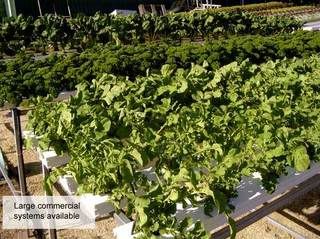Many different substrates are used for plant support in hydroponic culture, but one of the unique requirements for research is that the media be easily separated from the roots. Peat, perlite, and vermiculite are good substrates but roots and root hairs grow into these substrates, so they are unsuitable for studies of root size and morphology. Sand can easily be removed from roots, but roots grown in sand are shorter and thicker than hydroponic roots because the sand particles are so dense. We have also found that plant growth in sand is less than in other substrates, presumably because of reduced root growth. Calcined clay (brand names: Turface, Profile, Arcillite) was the medium of choice for research hydroponics for many years because it can easily be removed from roots. Calcined clay, however, has two disadvantages: 1) It is not chemically inert. Different batches supply different amounts of available nutrients and this causes variable results. It can be repeatedly rinsed in nutrient solution to desorb undesirable nutrients, but this adds to its cost. 2) Calcined clay is not a uniform particle size, and the water holding capacity depends on particle size. Not all batches are the same.
We recently tested and began using an extruded, diatomaceous-earth product called Isolite. Isolite is mined off the coast of Japan where there is a unique diatomaceous-earth deposit mixed with 5% clay. The clay acts as a binder in the extrusion and baking of the diatomaceous-earth. Diatomaceous-earth materials were originally organisms composed primarily of silicon dioxide (SiO2). Silicon dioxide is physically and chemically inert and these characteristics make it useful for horticultural applications like putting greens and urban trees where the soil is subject to severe compaction. Isolite is available in particle sizes from 1 to 10-mm diameter. Our tests indicate that Isolite is chemically inert and has good water holding characteristics. Its disadvantage is cost at $1.22 per Liter ($.79 per pound) for small quantities, although it can be reused. We have reused it after rinsing and drying at 80 C. Isolite is made by Sumitomo
ISOLITE: A NEW SUBSTRATE FOR HYDROPONICS
8:40 AM
ThanateTan







